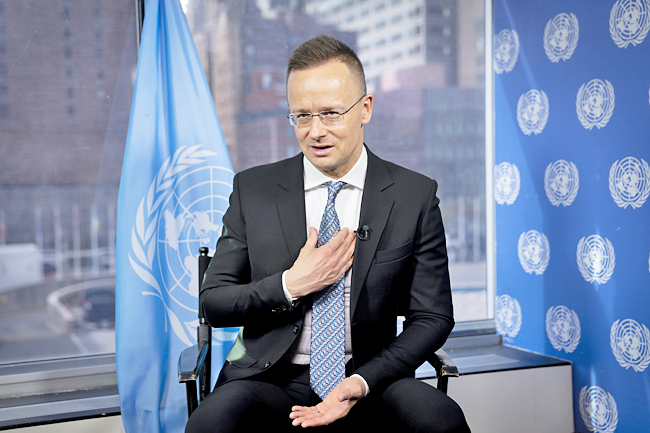Criticism makes it hard to cooperate with West, says Hungarian …
UNITED NATIONS (AP) - The West's steady criticism of Hungary on democratic and cultural issues makes the small European country's right-wing government reluctant to offer support on practical matters, specifically North Atlantic Treaty Organisation (NATO)'s build-up against Russia, Hungary's foreign minister Peter Szijjarto said. In an interview with The Associated Press, Szijjarto also said on Friday that his country has not voted on whether to allow Finland and Sweden to join NATO because Hungarian lawmakers are sick of those countries' critiques of Hungarian domestic affairs. Lawmakers from the governing party plan to vote today in favour of the Finnish request but "serious concerns were raised" about Finland and Sweden in recent months "mostly because of the very disrespectful behaviour of the political elites of both countries towards Hungary", Szijjarto said.
"You know, when Finnish and Swedish politicians question the democratic nature of our political system, that's really unacceptable," he said. The European Union (EU), which includes 21 NATO countries, has frozen billions in funds to Budapest and accused populist Prime Minister Viktor Orban of cracking down on media freedom and human rights. Orban's administration has also been accused of tolerating an entrenched culture of corruption and co-opting state institutions to serve the governing Fidesz party.
 Minister of Foreign Affairs of Hungary Peter Szijjarto during a recent interview with The Associate Press.
Minister of Foreign Affairs of Hungary Peter Szijjarto during a recent interview with The Associate Press.
PHOTO: AP
In a European Parliament resolution, EU lawmakers declared last year that Hungary had become "a hybrid regime of electoral autocracy" under Orban's nationalist government and that its undermining of the bloc's democratic values had taken Hungary out of the community of democracies. That criticism raised objections within Hungary and made it hard for the government to support Finland and Sweden's bids to join NATO, Szijjarto said. When it comes to the invasion of Ukraine, Szijjarto said that his country's advocacy of peace does not mean accepting that Russia would keep the territory it currently controls.
"You know, stopping the war and sitting around the table does not mean that you accept the status quo," he said. "When the war stops and the peace talks start, it's not necessary that the borders would be where the front lines are. We know this from our own history as well... ceasefire has to come now." As for relations with the United States (US), Szijjarto said they had a heyday under former US president Donald Trump.
His government found things more difficult under current president Joe Biden.
Key to that relationship was Trump's acceptance of Hungary's policies toward its own citizens.
Szijjarto said Trump was more welcoming of such measures than the Biden administration.